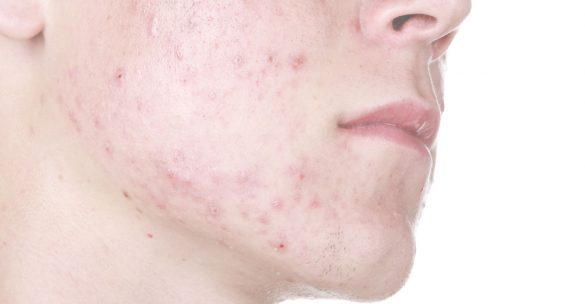Acne is an extremely common chronic skin condition, which affects both men and women. Acne isn’t just a teenage problem, many men and women into their 40’s also suffer from acne. People of all ages and races can suffer from acne, which is why better understanding of acne can lead to more effective treatment.
 Acne is usually associated with a sensitivity to an androgen hormone dihydrotestosterone (DHT) which leads to the skin producing too much oil and increases skin cell production, which in turn, leads to the acne causing bacteria to generate and multiply. There is also a build-up of dead skin cells lining the pores which are not shed properly and in turn clog up the follicles. The blocked follicles result in a build up of oil, producing blackheads and whiteheads.
Acne is usually associated with a sensitivity to an androgen hormone dihydrotestosterone (DHT) which leads to the skin producing too much oil and increases skin cell production, which in turn, leads to the acne causing bacteria to generate and multiply. There is also a build-up of dead skin cells lining the pores which are not shed properly and in turn clog up the follicles. The blocked follicles result in a build up of oil, producing blackheads and whiteheads.
Acne starts with blackheads, which is classed as mild acne. This then pustules and papules, which is classed as moderate acne. This can develop into severe acne, which includes lesions such as nodules and cysts. Acne is easily recognised by the appearance of these red or pus-filled spots and by their distribution on the face, neck, chest or back. There are several varieties of acne and a dermatologist can often tell you which type you have after examining your skin.
Although there is no “cure” for acne, the right treatment can essentially mean full control of your skin, preventing the formation of new spots and scarring. In general, most acne treatments take 2 to 4 months to produce their maximum effect.
Acne treatments primarily consist of regular cream/gel, or oral tablet treatment. The oral treatment can be an antibiotic, contraceptive pill (for females) or a very high dose of vitamin A type tablets called Retinoids.
Is acne caused by too many hormones?
It is not the level of hormones that causes acne, but the sensitivity to them.
Is acne caused by a poor diet?
Individual foods cannot cause acne, and there is no hard evidence that shows specific foods can cause or worsen acne. There is stronger evidence to suggest that low zinc levels may play a role, but zinc deficiency is extremely unlikely in the majority of acne patients.
Lack of good nutrition however will reduce the skins capacity to fight infection and to heal itself.
Is acne caused by poor hygiene?
Acne is a systematic inflammatory condition and is not due to an individual being unhygienic or unclean.
A good skin care regime is important to remove surface make-up, grime and dead skin cells, which can cause skin congestion and blocked pores. On the other hand, a harsh cleansing regime will also have a negative impact on your skin as it increases the disturbance of vital acid balance and barrier function of the skin against infection. A harsh regime can also lead to dehydration of the skin.
Is acne different to spots?
Yes. Acne is a chronic condition of inflammation of the pill-sebaceous unit, driven by internal and hormonal factors. Many people will suffer from occasional inflammatory breakouts, but these are contained and non-persistent.
Do you grow out of acne?
For the majority of people, acne tends to be resolved by their late teens or early twenties. But it can persist for longer and develop for the first time in people in their late twenties to even their thirties.
The occurrence of mature acne from the age of 25 affects a large proportion of the female population. Only 3% of males have acne beyond the age of 40.
What about lasers?
There have been developments in the use of light and laser therapy for inflammatory acne. These forms of treatment have yet to be fully evaluated and are generally ineffective in the treatment of severe inflammatory acne.
Laser resurfacing of facial skin to reduce post-acne scarring is, however, an established technique requiring the skills of an experienced laser surgeon.
How can you help your acne?
- Do not pick or squeeze your spots as this usually aggravates them and may cause scarring.
- Take action to control your acne as soon as possible. This helps to avoid permanent scarring and reduces embarrassment. If your acne is mild, it is worth trying over-the-counter treatments
- Expect to use your treatments for at least 2 months before you see much improvement. Make sure that you understand how to use them correctly so you get the maximum benefit
- Use oil-free moisturiser where possible. If you wear make-up, wear products that are oil free or water based
- Cleanse your skin and remove make-up with a mild soap, a gentle cleanser and water or, an oil-free soap substitute. Scrubbing too hard can irritate the skin and make your acne worse
If you are struggling to control your acne, please call us on 01603 819125 and book a face-to-face consultation where one of our expert dermatologists can create a personalised treatment plan that fits around you.


